
Apple cider vinegar is famously touted as a health tonic, one that’s often taken as a shot first thing in the morning. It’s been associated with better gut health, digestion, blood sugar control, and weight management, among many other things. Then there’s pickle juice. This has its own equally long list of potential benefits, such as helping with muscle cramps, promoting hydration, and even acting as a laxative.
So, what about pickle juice vs apple cider vinegar? The two liquids have a surprising number of features in common, including their focus on vinegar and reported health benefits. Sometimes, you can even use apple cider vinegar instead of pickle juice in a recipe (or vice versa).
Pickle Juice Vs Apple Cider Vinegar

Before we dig into the comparison, there’s a crucial point to make – pickle juice comes in two forms. One of these is fermented, while the other relies on vinegar instead. For the moment, we’re just talking about the vinegar-based version, as this is the most similar to apple cider vinegar. We’ll come back to the fermented style later.
Appearance
Apple cider vinegar often has a yellow-brown color that can be similar to apple juice or a touch darker. Pasteurized versions tend to be transparent, while unpasteurized versions may be cloudy instead and have sediment at the bottom.
This difference in appearance is due to the yeast that is used to ferment the vinegar. Pasteurized and filtered products remove this yeast, while more natural products allow it to remain.
Pickle juice is typically transparent but has a familiar yellow-green color from the cucumbers. The intensity of this varies, with some products having a slight yellow-green tinge and others being much more vibrant (excessively vibrant versions may be using additives to boost the color).
How They’re Made
Pickle juice is simply the liquid that surrounds pickles. So, to make it, you just need to prepare pickles.
The process is very easy for vinegar-based pickles. You just need to heat vinegar, salt, water, and any spices you want in a small pot, then allow the liquid to cool. This liquid can then be added to a jar with your cucumbers and any other desired vegetables.
After this, you simply store the jar in the fridge. Your pickles (and pickle juice) will be ready within 24 hours. Leaving them in the fridge for longer than this gives you an even better product, as the flavors intensify.
In contrast, apple cider vinegar is apple juice that has been through two fermentation steps (a similar approach is used for other types of vinegar as well). The first step converts the sugars in the juice to alcohol, while the second step converts this alcohol into vinegar.
The process of making apple cider vinegar is more complex than pickle juice, so many people buy apple cider vinegar instead. However, you can make it at home with a little patience and a good recipe.
So, you have two fermentation steps for apple cider vinegar and no fermentation for pickles made with vinegar. It’s no wonder that the products taste so different.
Their Flavor
Apple cider vinegar and pickle juice both have tart and tangy notes, with distinct acidity. Apple cider vinegar also has some characteristic fruity and wood flavors, with a little sweetness, while pickle juice typically has a more intense flavor and a salty aftertaste.
There’s also more variation in the flavor of pickle juice compared to apple cider vinegar. After all, pickle juice can use different herbs, spices, and vegetables in the recipe, not to mention different quantities of salt and sugar. Because of this, each pickle recipe has its own distinct flavor profile.
Nutritional Profile

Apple cider vinegar is very low in nutrients. You get a tiny amount of magnesium, calcium, and potassium per serving, but not enough to cause noticeable health benefits (especially as you’re not consuming much of the vinegar at a time).
There’s also less than half a gram of sugar per teaspoon of apple cider vinegar and negligible amounts of fat, fiber, and protein.
Pickle juice tends to be very low in calories, fat, and protein as well. Pickle juice also offers potassium, along with small amounts of calcium and magnesium.
The biggest differences are salt and sugar, as pickle juice tends to be very high in sodium. Some recipes include a decent amount of sugar as well, especially for bread and butter pickles. The presence of salt and potassium in pickle juice is why this is sometimes used as a sports drink.
Beyond this… both products contain antioxidants, so they should help to decrease oxidative stress and inflammation.
Their Probiotic Content
Probiotics have considerable potential for promoting health. They’ve been linked to a better balance of microbes in our gut, which can then promote better mood, increased disease resistance, improved digestion, and plenty of other positive effects.
Pickle juice and apple cider vinegar are both touted as being great sources of probiotics. But, there’s a catch in both cases.
For pickle juice, it’s only the fermented kind that offers probiotics. Vinegar-based pickle juice doesn’t give you these microbes at all.
Apple cider vinegar that contains the mother and hasn’t been pasteurized should contain probiotics. However, the probiotic content isn’t that great. The probiotics present also aren’t the ones commonly associated with improved health.
May Help Stabilize Blood Sugar
Research suggests that vinegar, including apple cider vinegar, can help to stabilize blood sugar levels when consumed at meal time or before bed. This effect could be powerful for people with diabetes. But, even if you’re not a diabetic, better blood sugar control is generally a good thing.
This effect comes from vinegar, so vinegar-based pickle juice could help with blood sugar levels as well. However, research hasn’t proven this effect and other compounds in pickle juice could interfere with its ability to lower your blood sugar levels.
Other Potential Health Benefits

Apple cider vinegar and pickle juice both have other potential health benefits.
For pickle juice, these include being able to help with gut health, nausea, heartburn, and muscle cramps. For apple cider, potential benefits include helping with weight loss, digestion, and cholesterol.
You may also see reduced inflammation and oxidation from both liquids, due to their plant-based compounds. Some of these benefits might reduce your risk of diseases and perhaps even help you to live longer.
Still, there’s an important point to make here – many of the potential benefits of apple cider vinegar and pickle juice haven’t been proven. Sometimes studies haven’t been able to prove an effect at all. Other times, the research simply hasn’t been done.
Some proposed benefits may play out in practice, while others may simply be hype. It’s important to pay attention to your body to see what effect the liquids have for you personally.
The Salt Content
We’ve already talked about nutrients, but sodium deserves a special mention. Apple cider vinegar contains very little sodium, making it safe for people at risk of heart problems.
Pickle juice is an entirely different story. Even the vinegar-based version tends to be high in sodium. This is a concerning feature, given that many of us consume too much sodium. Plus, high sodium intake is associated with a variety of problems, including high blood pressure, fluid retention, and heart disease.
Risks And Side Effects
Apple cider vinegar and pickle juice are both highly acidic, often falling between a pH of 2 and 3. This acidity can be a problem for people with acid reflux, ulcers, poor tooth enamel, or kidney stones. If you fall into any of these categories, the drinks could cause health problems, rather than helping.
Consuming large quantities of these drinks could also lead to other issues, such as digestive side effects and delayed stomach emptying. You’ll need to monitor the amount you consume and any symptoms to ensure your health is protected.
How You Use Them
Pickle juice and apple cider vinegar are both sometimes seen as a health tonic and taken in shot form. However, there are plenty of other uses too.
Apple cider vinegar is most commonly used in marinades and salad dressings, where it provides a tangy flavor. You can use it in most recipes that call for regular vinegar. It is often used in non-food ways too, such as hair care, skincare, and cleaning.
Interestingly, apple cider vinegar can even be used to make pickles. Apple cider vinegar works well here, as it isn’t as intense as white vinegar, so your pickles can taste milder.
Pickle juice is much more versatile, partly because of its appealing flavor. It still features in marinades and salad dressings, but you’ll see it in plenty of other places too, like an ingredient in deviled eggs, salsa, dips, macaroni cheese, and even cocktails.
Which Is Healthier, Pickle Juice And Apple Cider Vinegar?

There isn’t a clear winner between pickle juice and apple cider vinegar, especially as the liquids have so much in common. But, if you’re looking for nutrients, then pickle juice is a slightly better choice. If you’re worried about your sodium intake, try sticking with apple cider vinegar instead.
Your choice might ultimately come down to the flavor differences rather than health effects. After all, pickle juice has a strong flavor that works well in many recipes.
You can also easily make pickle juice at home. This allows you to experiment with the flavor profile, such as by changing up the herbs or even adding some jalapenos.
Can You Use Apple Cider Vinegar Instead Of Pickle Juice?
While apple cider vinegar isn’t as flavorful as pickle juice, it still contains vinegar and a distinct sharpness. This means you can still use it in many of the same recipes. The reverse is also true – pickle juice will work in some recipes that call for apple cider vinegar.
When deciding whether to make a substitution, think of the flavor profile of your recipe. If the presence/absence of pickle juice flavor would make a big difference, the substitution mightn’t work well.
You could also simply experiment. You might find that your new recipe is even better than the original.
The Case Of Fermented Pickle Juice
Fermented pickle juice is a special case that relies on salt brine and natural microbes. The fermentation process means you get plenty of probiotics (providing the pickle juice wasn’t pasteurized).
Lactobacillus bacteria feature heavily in pickle juice, which is great news as this type of microbe has been frequently researched and linked to many health benefits. As such, fermented pickle juice contains many more probiotic benefits than vinegar-based pickle juice or apple cider vinegar.
Fermented pickle juice often tastes better vinegar-based version anyway, as it has a more complex and nuanced flavor profile.
However, it isn’t all good news. There’s still a ton of salt in this pickle juice, which can contribute to health problems. There’s also no vinegar, so you won’t see the blood sugar effect or any other vinegar-based health benefits.
Final Thoughts

Pickle juice and apple cider vinegar have distinctive appearances and flavors, to the extent you might think they’re completely unrelated. Yet, many pickle juice recipes use vinegar as a base ingredient. This gives you many of the same benefits that you find with apple cider vinegar.
Of course, that claim only applies to the quick pickles style of pickle juice. Fermented pickle juice doesn’t rely on vinegar, so it has some distinctive features.
Frequently Asked Questions
How Much Pickle Juice Should You Drink A Day?
Recommendations for pickle juice vary, ranging from one ounce of pickle juice to three ounces per day. Most people will be best on the lower end of that range due to the sodium in pickle juice.If you don’t consume much sodium currently, three ounces of pickle juice daily might be okay. However, paying attention to your physical responses is crucial, as pickle juice is also acidic and doesn’t work well for everyone.
How Much Apple Cider Vinegar Should You Drink A Day?
One or two tablespoons of apple cider vinegar is a decent amount of apple cider vinegar for most people. It’s best to dilute this in a glass of water. Doing so reduces the risk you’ll damage the enamel on your teeth. Higher servings than this probably aren’t helpful and could easily cause issues.
Can You Buy Pickle Juice?
The most common approach is to buy or make pickles and then use the juice that comes with them. A few places do things differently and actually sell pickle juice on its own. Best Maid Dill Juice and Mount Olive Pickle Juice are two examples that give you plenty of pickle juice to experiment with.
Can You Use Apple Cider Vinegar To Make Pickle Juice?
You can indeed. Some recipes use apple cider vinegar as the main ingredient, while others use a combination of white vinegar and apple cider vinegar.

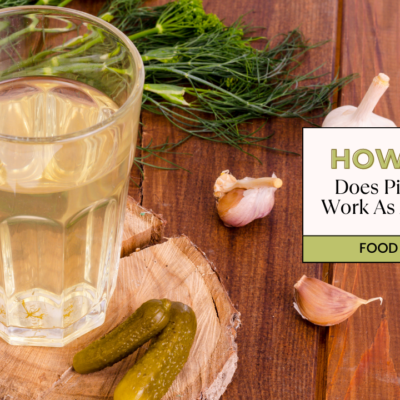
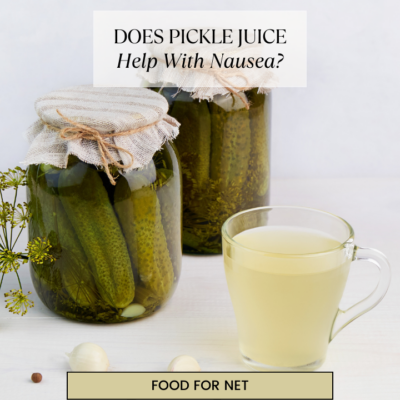

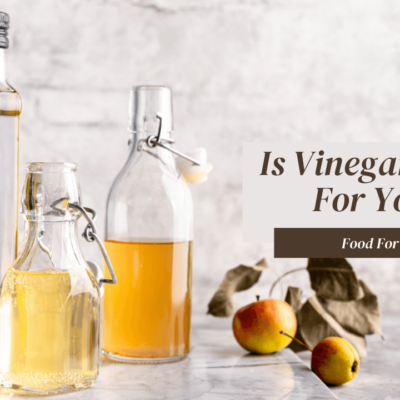
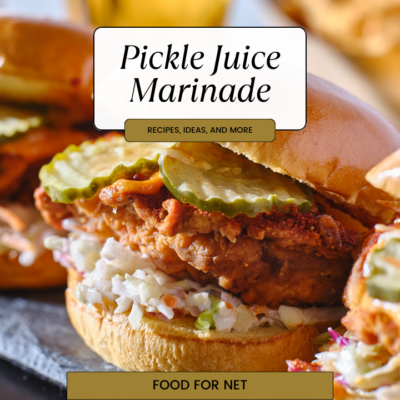
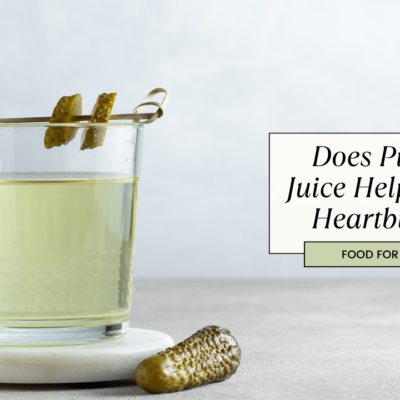
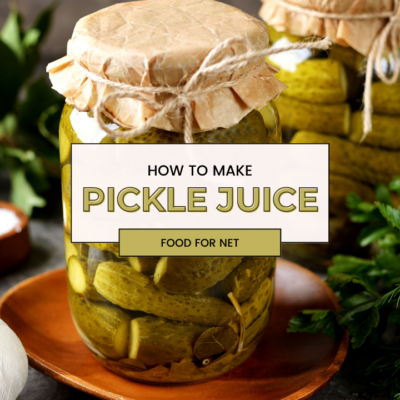


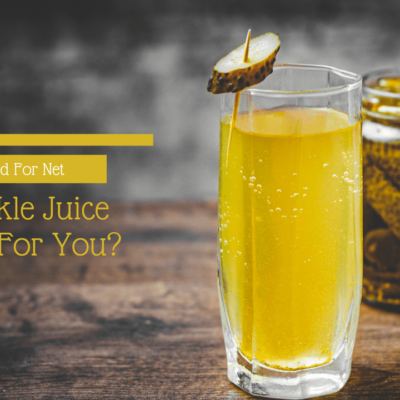

 How To Make Pickled Eggs With Pickle Juice
How To Make Pickled Eggs With Pickle Juice
Leave a Reply